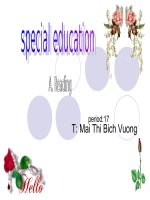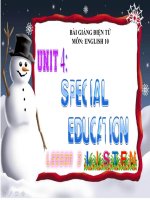UNIT 4. SPECIAL EDUCATION - English 10
Bạn đang xem bản rút gọn của tài liệu. Xem và tải ngay bản đầy đủ của tài liệu tại đây (1.63 MB, 23 trang )
Welcome teachers to
Welcome teachers to
our class
our classsport
four
more
doctor
job
call
boss
wrong
walking
box
talk
top
15141311129876543
2
1010
sport
four
more
doctor
job
call
boss
wrong
walking
box
talk
top
22232425262728293021201 91817161514131112987654321010
UNIT 4. SPECIAL EDUCATION
Period 24. Lesson 5. Language focus
I. Pronunciation / ɔ / - /ɔ: /
+ Listen and repeat.
o đứng trước 1 hoặc 2 phụ âm( trừ r ) thường phát âm là / ɔ /
Còn or, ou, our, al thường phát âm là /ɔ: /
Notes:
/ ɔ / / ɔ : /
top
boss
doctor
wrong
job
box
call
sport
four
walking
more
talk
UNIT 4. SPECIAL EDUCATION
Period 24. Lesson 5. Language focus
1. Put the socks on top of the box.
2. He lost his job as a doctor in the hospital.
3. What’s wrong with you, boss?
4. Is walking called a sport?
5. He can’t talk to her any more.
6. Four of us have walked for fourteen miles.
UNIT 4. SPECIAL EDUCATION
Period 24. Lesson 5. Language focus
I. Pronunciation / ɔ / - /ɔ: /
+ Listen and repeat.
+ Practice these sentences.
UNIT 4. SPECIAL EDUCATION
Period 24. Lesson 5. Language focus
II. Grammar and vocabulary
I. Pronunciation: / ɔ / - /ɔ : /
Form:
1. The + adjective
The + adjective
.
UNIT 4. SPECIAL EDUCATION
Period 24. Lesson 5. Language focus
II. Grammar and vocabulary
I. Pronunciation: / ɔ / - /ɔ : /
Form:
The + adjective = common noun. Chỉ một nhóm người có
cùng một đặc tính nào đó theo nghĩa chung của tính từ.
Động từ theo sau phải chia ở dạng số nhiều.
Notes:
1. The + adjective
The + adjective
Ex:Complete these sentences using the + one of the adjectives
injured poor rich sick unemployed young
!"#######
$%!&!
#########
'(!)
#####
*+! ,!+
!!##### #####
UNIT 4. SPECIAL EDUCATION
Period 24. Lesson 5. Language focus
II. Grammar and vocabulary
1. The + adjective
I. Pronunciation: / ɔ / - /ɔ : /
the injured
the unemployed
the sick
the rich the poor
The young
UNIT 4. SPECIAL EDUCATION
Period 24. Lesson 5. Language focus
II. Grammar and vocabulary
I. Pronunciation: / ɔ / - /ɔ: /
2 years ago
now
1. The + adjective
UNIT 4. SPECIAL EDUCATION
Period 24. Lesson 5. Language focus
II. Grammar and vocabulary
I. Pronunciation: / ɔ / - /ɔ: /
4 years ago.
now.
1. The + adjective
UNIT 4. SPECIAL EDUCATION
Period 24. Lesson 5. Language focus
II. Grammar and vocabulary
I. Pronunciation: / ɔ / - /ɔ: /
2 years ago now
4 years ago.
now
"
!
Form:
( + ) S + used to + infinitive
( - ) S + did not use to + infinitive
( ? ) Did + S + use to + infinitive?
- Yes, S + did.
- No, S + didn’t.
1. The + adjective
2. Used to + infinitive
UNIT 4. SPECIAL EDUCATION
Period 24. Lesson 5. Language focus
II. Grammar and vocabulary:
I. Pronunciation: / ɔ / - /ɔ : /
4 years ago now
2 years ago.
now
Form:
1. The + adjective
2. Used to + infinitive
Use :
Cấu trúc trên dùng để diễn tả 1 thói quen hay 1 trạng thái
nào đó trong quá khứ mà nay không còn nữa.
- "/0!/1230
( + ) S + used to + infinitive
( ) S + did not use to + infinitive
( ? ) Did + S + use to + infinitive?
- Yes, S + did.
- No, S + didn’t.
UNIT 4. SPECIAL EDUCATION
Period 24. Lesson 5. Language focus
II. Grammar and vocabulary:
I. Pronunciation: / ɔ / - /ɔ : /
1. The + adjective
2. Used to + infinitive
45 6used to 1!!
1. Dennis gave up smoking two years ago. He 40 cigarettes a day.
2. Liz ######### motorbike, but last year she sold it and bought a car.
3. We came to live in Manchester a few years ago. We##### in
Nottingham.
4. I rarely eat ice scream now, but I ########it when I was a child.
5. Jim ####### my best friend, but we aren’t friends any longer.
6. It only takes me about 40 minutes to get to work since the new road was
opened. It #######more than an hour.
7. There ####### a hotel opposite the station, but it closed a long time ago.
8. When you lived in London, ###you##### to the theatre?
used to have / ride
used to live
used to eat
used to be
used to be
used to take
did use to go
used to smoke
UNIT 4. SPECIAL EDUCATION
Period 24. Lesson 5. Language focus
II. Grammar and vocabulary:
I. Pronunciation: / ɔ / - /ɔ : /
1. The + adjective
2. Used to + infinitive
7777777 "
6
UNIT 4. SPECIAL EDUCATION
Period 24. Lesson 5. Language focus
II. Grammar and vocabulary:
I. Pronunciation: / ɔ / - /ɔ : /
1. The + adjective
2. Used to + infinitive
7777777 " 6
",6 6
3. “Which” as a connector
)12,612
Form:
UNIT 4. SPECIAL EDUCATION
Period 24. Lesson 5. Language focus
II. Grammar and vocabulary:
I. Pronunciation: / ɔ / - /ɔ : /
1. The + adjective
2. Used to + infinitive
7777777 " 6
"&6 6
3. “Which” as a connector
84 6
84 &6 6
Which9:;<;.=& ;>?@A BC D;<
:Which=@E;F;>?;<G>0.
WhichH;.IA JKL D;<AK D
;<M.NO
Notes:
)12,612
UNIT 4. SPECIAL EDUCATION
Period 24. Lesson 5. Language focus
II. Grammar and vocabulary:
I. Pronunciation: / ɔ / - /ɔ : /
1. The + adjective
2. Used to + infinitive
3. “Which” as a connector
( 6 P "6Q:which=
P
)R
(R
$-4
'S6
*
T+
US!"6
6
! 6R6 6
"
"
6
6
66
1 2 3 4 5 6 7
c ba df ge
1. Sheila couldn’t come to the party, which was a pity.
UNIT 4. SPECIAL EDUCATION
Period 24. Lesson 5. Language focus
II. Grammar and vocabulary:
I. Pronunciation: / ɔ / - /ɔ : /
1. The + adjective
2. Used to + infinitive
3. “Which” as a connector
1 2 3 4 5 6 7
c ba df ge
( 6 P "6Q:which=
1. Sheila couldn’t come to the party, which was a pity.
2. Jill isn’t on the phone, which makes it difficult to contact her.
3. Neil has passed his exams, which is good news.
4. Our flight was delayed, which meant we had to wait for hours at the airport.
5. Ann offered to put me up for the night, which was kind of her.
6. The street I live in is very noisy at night, which makes difficult to
sleep.
7. Our car has broken down, which means we can’t go away tomorrow.
Choose the best answer A, B, C or D
####!
P 5 V
+##
P
5 V
$R6&##
6 P65 V
'- #
" P "5 " V "
a b c d e2 4 1 3
B
D
A
C
UNIT 4. SPECIAL EDUCATION
Period 24. Lesson 5. Language focus
UNIT 4. SPECIAL EDUCATION
Period 24. Lesson 5. Language focus
I. Pronunciation: / ɔ / - /ɔ : /
1. The + adjective
2. Used to + infinitive
3. “Which” as a connector
II. Grammar and vocabulary:
( + ) S + used to +infinitive
( - ) S + did not use to + infinitive
( ? ) Did + S + use to + infinitive?
Yes, S + did.
No, S + didn’t.
The + adjective
S + V , which + V
-
Practice pronouncing the sounds:
/ ɔ / - /ɔ: /
-
Do again exercises 1,2 ,3.
-
Prepare Unit 5 – Lesson 1:Reading









